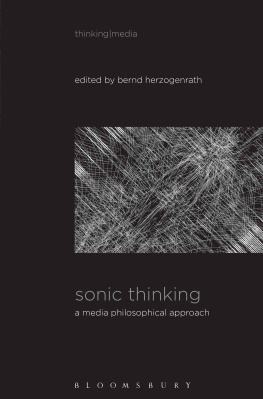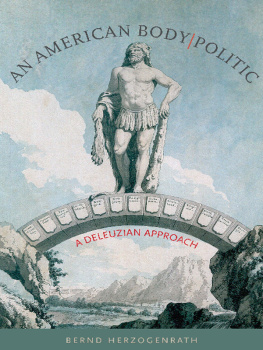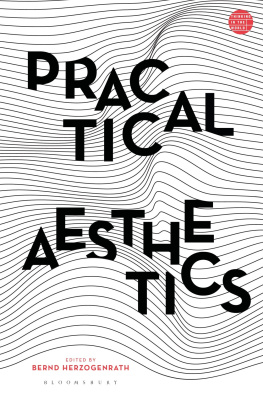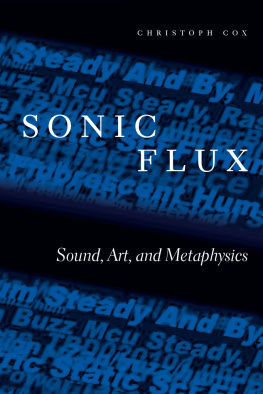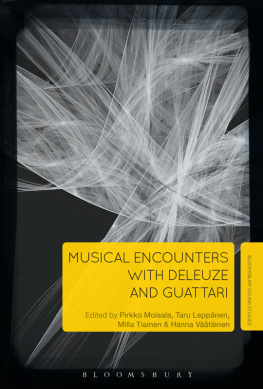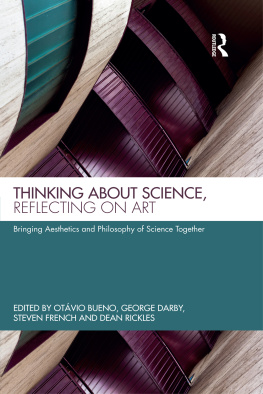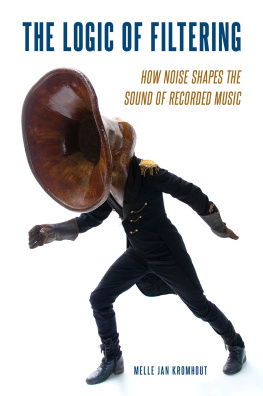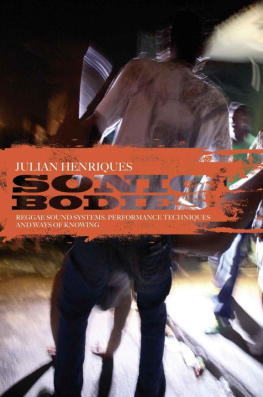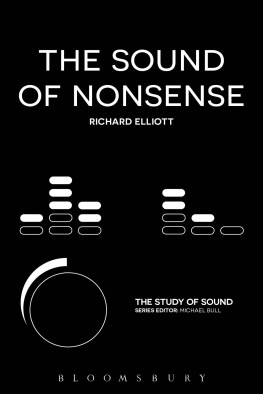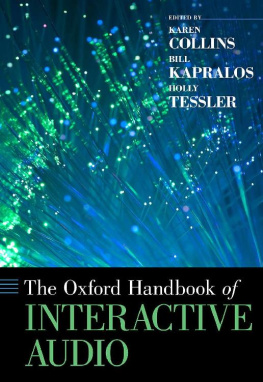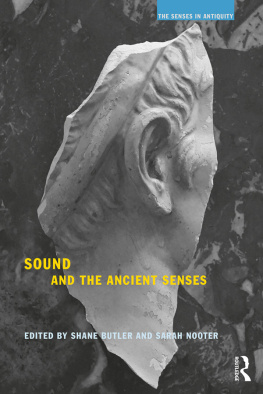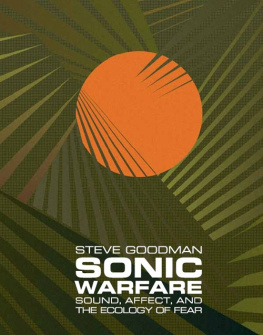Sonic Thinking
thinking|media
Series Editors
Bernd Herzogenrath
Patricia Pisters

Contents
I would like to express my gratitude to bloomsbury (in particular the wonderful Katie Gallof and Mary Al-Sayed) for giving us and me the opportunity to publish this book, and to all those wonderful people that contributed to this volumeit has been a pleasure! Special thanks go out to Sebastian Scherer, for all the work you have put into this!
I dedicate this book to Janna and Claudia, and to the memory of Frank.
Two-and-a-half of the essays in this book had a previous life in online-journals, in slightly different versions:
Christoph Coxs essay appeared as slightly different versions in Artpulse 16 (2013) and Realism Materialism Art, ed. Christoph Cox, Jenny Jaskey, and Suhail Malik (Berlin: Sternberg Press 2015).
Achim Szepanskis essay also appeared in a slightly different version in Realism Materialism Art, ed. Christoph Cox, Jenny Jaskey, and Suhail Malik (Berlin: Sternberg Press 2015).
A small part of Bernd Herzogenraths essay already appeared as The Weather of Music: Sounding Nature in the 20th and 21st Centuries, Deleuze|Guattari & Ecology, ed. Bernd Herzogenrath, Houndmills: Palgrave Macmillan 2009, 21632.
all republished with kind permission.
Jessie Beier is a teacher, artist, and independent scholar based in Edmonton, Alberta. Beier completed a Masters Degree in Curriculum Studies in 2014 with the thesis project Schizophrenizing the Art Encounter: Towards a Politics of Dehabituation. Beiers interests in both visual and sonic ecologies have led to a research and writing practice that works to think art, in its many forms, as a power for overturning clich and dismantling common sense habits of interpretation. Beier has worked in a variety of settings as a researcher, educator, and program developer and currently teaches in the Department of Secondary Education at the University of Alberta. In addition to her scholarly work, Beier is also a practising artist and musician, working mainly in video and sound installation. Beier has presented her research locally and nationally, and has published writing in Visual Arts Research (University of Illinois Press), The Journal of Curriculum and Pedagogy (Taylor and Francis), and The Alberta Journal of Educational Research (University of Alberta).
Sabine Breitsameter is an expert on experimental electroacoustic art forms. She has been working since the mid-1980s for German public radio within the field of radio drama and documentary as author, director and dramaturge, and as a festival director and curator for, e.g., Documenta/Kassel, Academy of Arts/Berlin, Ars Electronica/Linz, and ZKM Karlsruhe. As a professor for Sound and Media Culture she researches and teaches at Hochschule Darmstadt/Germany since 2006. She co-founded the Master program Soundstudies at the University of Arts Berlin, where she worked as a guest professor for Experimental Audiomedia from 2004 to 2008. Her publications include Die Ordnung der Klnge (Schott International 2010): a new German edition and translation of R. Murray Schafers The Tuning of the World, writings on listening culture, audiomedia history, and currently on her research project in progress exploring 3D audio and 360 cinema.
Angus Carlyle is a researcher at CRiSAP at the University of the Arts, London, where he is Professor of Sound and Landscape. He edited the book Autumn Leaves (2007), co-edited On Listening (2013) and co-wrote In The Field (2013). His art works have included 51 32 6.954 N/0 00 47.0808 W (2008), Noli Me Tangere (2009), Some Memories of Bamboo (2009) and Air Pressure (20112013), a collaboration with anthropologist Rupert Cox. His new project with Cox, Zawawa (2015) extends Carlyles fascination with the heard world of people and place, memory and presence. In 2016, A Downland Index, a book-length experiment in nature writing was published by uniformbooks and the album In The Shadow of the Silent Mountains, an intersection between text, image and sound, was released by Gruenrekorder.
www.anguscarlyle.com
Krien Clevis has been active as an artist, researcher and curator. As a professor in the Arts Faculty Maastricht, she teaches Artistic Research in the Fine Arts department. She is involved in a post-doc project at the Lectureship Autonomy and Public Sphere in the Arts at the same faculty. In Rome she has performed research on the Via Appia, in collaboration with archaeological researchers from Radboud University Nijmegen and the Royal Dutch Institute in Rome (KNIR). She earned a PhD by writing a dissertation, entitled LOCVS. Herinnering en vergankelijkheid in de verbeelding van plaats: van Italische domus naar artistiek environment/LOCVS. Memory and Transience in the Representation of Place: From Italic Domus to Artistic Environment (Amsterdam: Jan de Jong/De Buitenkant 2013). This PhD project was devoted to artistic research of the notion of quality of place, through a consideration of archaeological and other debates on place and study of the physical and qualitative features of place, especially in historical sites. As an artist she creates new places of meaning: places caught within a dynamics of change and subject to being overwritten all the time. Major concepts in her research are genius loci, palimpsest and lieux de mmoire. By combining artistic, historical/archaeological and personal exploration of locations, she aims to add new meanings to the multilayered dimension of places.
Christoph Cox is Professor of Philosophy at Hampshire College and visiting faculty at the Center for Curatorial Studies, Bard College. He is the author of Sonic Flux: Sound, Art, and Metaphysics (forthcoming) and Nietzsche: Naturalism and Interpretation (California, 1999) and co-editor of Realism Materialism Art (Sternberg 2015) and Audio Culture: Readings in Modern Music (Continuum 2004). The recipient of an Arts Writers Grant from Creative Capital/Warhol Foundation, Cox is editor-at-large at Cabinet magazine. His writing has appeared in October, Artforum, Journal of the History of Philosophy, The Wire, Journal of Visual Culture, Organised Sound, The Review of Metaphysics, and elsewhere. He has curated exhibitions at the Contemporary Arts Museum Houston, The Kitchen, New Langton Arts, the G Fine Art Gallery, and the Brick & Mortar International Video Art Festival.
Aden Evens is Associate Professor of English at Dartmouth College in Hanover, New Hampshire. His research and teaching zig-zags across disciplinary lines, drawing on training in music, mathematics, software engineering, and philosophy. His 2005 monograph, Sound Ideas (University of Minnesota Press), takes a phenomenological and technological approach to the study of music, helping to usher in the nascent field of sound studies. His book, Logic of the Digital (Bloomsbury Academic 2015), traces the potentials and pitfalls of digital technologies by examining their underlying technical bases. If there is a piano, Aden will probably play it, which is either delightful or annoying, depending on how far away you are sitting.
Mark Fell is a multidisciplinary artist based in Sheffield (UK). After studying experimental film and video art at Sheffield City Polytechnic he initially reverted to earlier interests in computational technology, music, and synthetic sound. In 1998 he began a series of critically acclaimed record releases on labels including Mille Plateaux, Line, Editions Mego and Raster Noton. Fell is widely known for combining popular music styles, such as electronica and club musics, with typically academic approaches to computer-based composition with a particular emphasis on algorithmic and mathematical systems. Since his early electronic music pieces Fells practice has expanded to include moving image works, sound and light installation, choreography, critical texts and educational projects.

